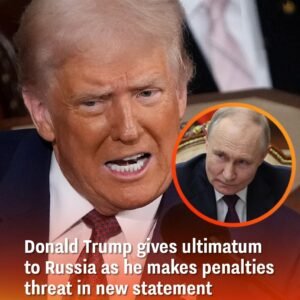Former President Donald Trump has issued a bold warning to Russia and Ukraine, urging them to negotiate a ceasefire immediately. Posting on his Truth Social platform, he stated that if the two nations fail to reach a peace agreement, he is “strongly considering” imposing large-scale banking sanctions and tariffs on Russia. His ultimatum, “get to the table right now, before it is too late,” signals a major shift in his approach to the ongoing war.
Trump’s announcement comes amid escalating violence in Ukraine, with reports of heavy Russian attacks leaving several civilians injured, including children. As the war drags on, the former president is positioning himself as a strong advocate for diplomatic resolution, using economic threats as leverage to push both sides toward peace talks.
His proposed sanctions would target Russian financial institutions, potentially cutting them off from the global banking system. Additionally, tariffs on Russian exports would increase economic pressure, making it harder for Moscow to sustain its military operations. This strategy is aimed at forcing Russia into negotiations while also putting pressure on Ukraine to seek a settlement.
Trump’s ultimatum has sparked reactions from across the political spectrum. Supporters argue that economic measures could accelerate the peace process, while critics warn that aggressive sanctions might escalate tensions. Some experts caution that isolating Russia financially could lead to unintended global economic consequences, impacting trade and energy markets.
Ukraine’s leadership has yet to respond directly to Trump’s call, but President Volodymyr Zelenskyy has repeatedly emphasized his willingness to negotiate for a lasting peace. His government is under immense pressure to secure a ceasefire, balancing the need for diplomacy with the reality of ongoing Russian aggression.
International allies have given mixed responses. European nations, long involved in diplomatic efforts, largely support economic pressure on Russia but worry that further sanctions might destabilize the region. The United Kingdom has reaffirmed its commitment to securing peace but has not explicitly backed Trump’s proposed economic measures.
Economic experts are divided on the effectiveness of Trump’s strategy. Some believe that severe banking sanctions could cripple Russia’s war efforts, while others warn that such measures might push Moscow closer to alternative financial systems, such as China’s. The potential impact on global markets remains a key concern.
Historically, economic sanctions have been used as a tool to enforce international law and pressure governments into negotiations. However, their success depends on multilateral cooperation. If the U.S. acts alone, the effectiveness of Trump’s threats may be limited, and Russia could seek economic support from other nations.
The situation remains fluid, and the potential consequences of Trump’s ultimatum are still unfolding. Whether his approach will push Russia and Ukraine toward a ceasefire or lead to greater tensions is uncertain. What is clear is that the conflict has reached a critical point, and the pressure to find a resolution is stronger than ever.
As the world watches, the stakes continue to rise. Trump’s ultimatum may prove to be a defining moment in the conflict, but its ultimate impact will depend on how Russia, Ukraine, and the international community respond in the coming weeks.
